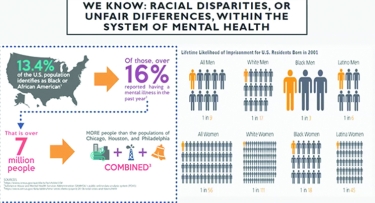
As part of the International Speakers Series, Mercy College’s Center for Global Engagement (CGE) hosted a virtual discussion on July 22, 2020 to explore various national-focused perspectives on the Black Lives Matter movement. The presenters were six Mercy faculty members: Susan Moscou, Ph.D.; Jude Aguwa, Ph.D.; Ilene Rothschild, Ed.D.; Cynthia Walley, Ph.D.; Sara Martucci, Ph.D.; and Victor Petenkemani, M.B.A.
“This is such an important event given the tumultuous times we’re in,” said Aiisha Harden Russell, Ph.D. — research and grants coordinator in Mercy’s Provost’s Office — who moderated the discussion. “Now, we have a renewed call to address the systemic racism on Black Americans given the unjust murders of Ahmaud Arbery, George Floyd and Breonna Taylor.”
After introductions by Associate Provost Saul Fisher, Ph.D., and Visiting Fellow Michiko Kuroda, Harden Russell welcomed the audience, and the six faculty members began their presentations on the Black Lives Matter movement from the perspective of their respective disciplines.
Moscou, associate professor of nursing and executive director of Mercy’s nursing program, spoke about the historical context of the Black Lives Matter movement, positing it as part of the ongoing struggle by Black Americans to achieve racial, social and economic equality. “Black Lives Matter did not come out of a vacuum,” she said. “Black people have been struggling from the time they were enslaved. There have been 400 years of inequality.” Her presentation involved a detailed timeline beginning in 1472 with the Portuguese negotiations of the first slave trade agreement and the first enslaved Africans arriving in Jamestown in 1619; continuing through the first fugitive slave law of 1793, the Emancipation Proclamation of 1863 and the Tulsa race massacre of 1921; and ending with the 2012 killing of Trayvon Martin, which launched the Black Lives Matter movement.
Aguwa, professor of religion, explored whether the Black Lives Matter movement could be seen as a historical inevitability. After noting the main sources of Western ethics, he gave several examples of ethical ambivalence about slavery, including the Jesuit priests who sold slaves to pay Georgetown University’s debts in 1838. He then briefly traced the ethical revolution brought about by abolitionists, modern philosophers and Black leaders such as Dr. Martin Luther King, Jr., which has culminated in a changing ethical sensitivity and a trend toward societal support for the Black Lives Matter movement.
Rothschild, associate professor of special education, focused on the Civil Rights movement of the 1950s and 1960s and shared five lessons about how we can move forward in addressing racial disparities in the education system. She asserted that justice can be legislated, schools play a vital role in creating and maintaining equal opportunities for students, teachers set a critical tone in establishing inclusive environments, parents’ attitudes are critical to shaping their children’s attitudes, and societal attitudes shape people’s attitudes as well.
Walley, associate professor of school counseling, discussed the racial disparities in Black mental health. She explained that mental health is shaped by social, political and systemic factors in addition to biological ones. Black Americans face barriers to receiving proper mental health care, including harboring mistrust of treatment, lacking health insurance and being misdiagnosed. The result is that Black Americans are much less likely to seek out mental health care, more likely to receive poor quality care and more likely to end care prematurely. These disparities have deep historical roots that extend all the way back to slavery when Black people were considered primitive, unwell, immoral, unfit for freedom and inherently criminal.
Martucci, assistant professor of sociology and behavioral science, spoke about the history of the policing of Black people, which has culminated in the recent deaths that have fueled the Black Lives Matter movement. For example, she described slave patrols that were created to control slave owners’ power, property and profit. Similar intimidation tactics continue today as the police are brought in to control people who are protesting for equal rights or treatment. She also unpacked the term “defund the police,” which refers to redistributing police funding to support other interventions.
Petenkemani, associate dean of the School of Business, discussed the role of the corporate sector in leading the fight against racial inequality. “The business community has a major role to play,” he explained. “This is not just the government’s role.” He shared that Black Americans have less earning power than a decade ago and that they are much more likely to be trapped in poverty. Since society relies on market forces to allocate resources, the private sector must play a bigger role in addressing these social issues, and there is indeed a renewed push for businesses to embrace their social responsibility.
The presentations were followed by a lively question and answer session that discussed topics on how to incorporate culturally responsive teaching into all levels of the educational system.
To view a recording of this webinar, please click here.
